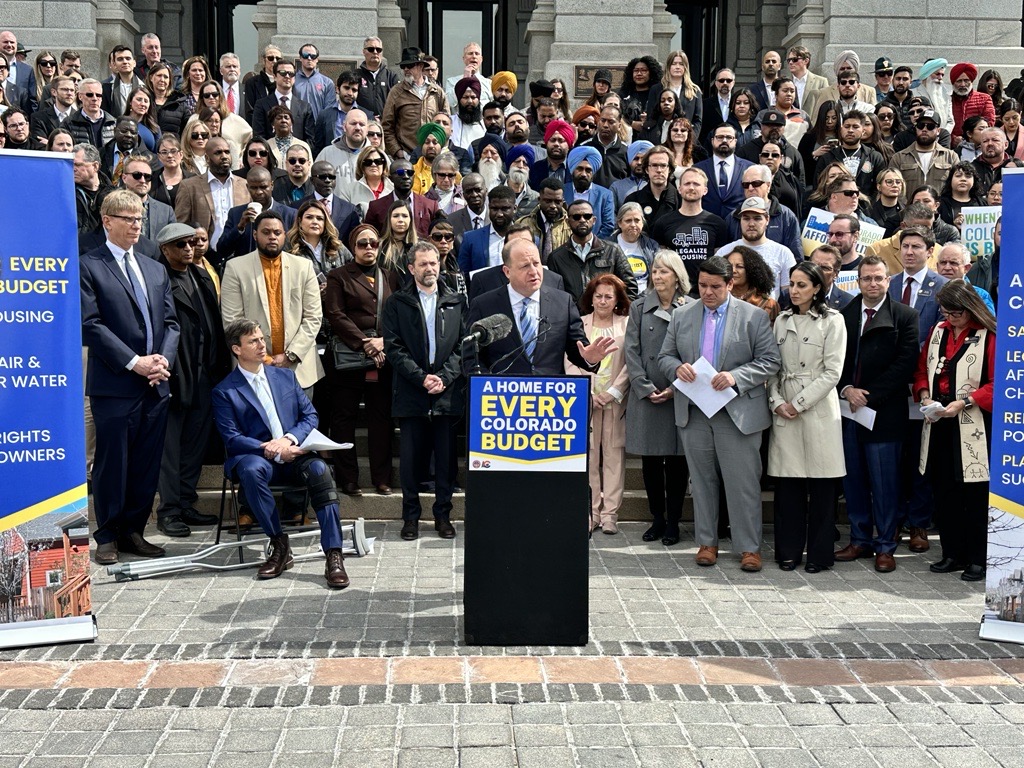Governor Releases Land Use Plan
Providing housing that is available and affordable is imperative for our economic competitiveness efforts and keeping Metro Denver the best place to live and do business in the state. Housing is the economic competitiveness issue of our state.
At a press conference on Wednesday, the Governor’s office released its new statewide housing plan. Senate Bill 213 Land Use will transform the way the state implements land use policy and will work to lift regulations and barriers so more housing, at an affordable price, can be built in the state. After examining the 106 page bill and meeting with key stakeholders, including the Governor’s office, the Chamber is encouraged by the bill’s intent to lift onerous regulations and deliver housing to the market.
The bill makes it easier to infill existing neighborhoods with denser housing units, eases zoning restrictions and other arbitrary regulations that have historically suffocated development, fast tracks certain development project approvals, and bolsters private property rights by making it easier for homeowners to improve their property and achieve its highest and best use.
Some of the stated goals of the bill are as follows:
- Support workforce and retention
- Cut red tape and regulatory barriers
- Reduce taxpayer costs
- Increase housing supply
- Increase homeownership opportunities
- Increase housing affordability
Some high-level details of the bill:
- The state will conduct a housing needs assessment every five years for different income levels and will also assess regions within the state. This assessment will serve as the basis for setting housing goals for communities statewide, and includes housing affordability and displacement toolkits, among others. Municipalities will then do their own housing needs assessments, including their plans to meet goals for multi-family, “key corridors," and transit-oriented developments.
- To reform zoning codes and municipal regulations, the bill creates two tracks for local governments to meet statewide standards in their zoning and land use codes. They may choose to create their own plan that includes the bill’s minimum standards, or to use a default model code.
- In some municipalities (Tier 1 Urban and Rural Resort communities), the bill requires Accessory Dwelling Units (ADUs) and middle-housing (duplexes, triplexes and multiplexes up to six units) to be approved as a use-by-right where Single-Family zoning is already a use-by-right. A municipality would approve an application for an ADU or middle housing by administrative review, fast tracking permitting. Local governments will maintain the ability to regulate short-term rentals in newly-built projects as a guardrail to ensure they are used to house workforce, but may not require additional parking requirements.
- The bill prohibits municipalities from requiring minimum unit size, parking minimums, familial status occupancy restrictions or from treating modular housing differently than site-built construction. Instead, the market will dictate what housing types, sizes and family makeup is suitable for each location—and lifting regulations that will bring down housing costs.
- In already-defined Transit-Oriented Communities, municipalities must allow multifamily development as a use-by-right with administrative review with a density bonus of 50% if developments include mixed-income affordable projects. There also cannot be set parking minimums in these areas, and the bill clarifies that these standards will apply in areas already designated as transit-oriented, to not disincentivize cities from creating TODs.
- The bill also creates specific regional approaches to housing for rural resort communities, recognizing that these communities have unique housing challenges and are best suited by following a different model than the rest of the state.
- Importantly, not all of the above standards apply equally across all urban settings: the bill defines urban municipalities, rural resort job center municipalities, non-urban municipalities, and also sets statewide standards. Some standards only apply to certain urban settings.
Our president and CEO, J. J. Ament, said this about the plan: “To keep Colorado competitive with neighboring states, it is an economic imperative that we develop housing for every budget. The lack of housing is one of the biggest concerns we hear from businesses looking to relocate or expand in Colorado. There are many stakeholders who need to rally to address our housing crisis, and it is a complicated policy problem, no doubt. We look forward to working with Governor Polis, legislators, local government leaders and our business community through this bill to craft real incentives and solutions. Statewide awareness of the issue is essential – and while communities need some flexibility to best accomplish our collective goals, this bill and the Governor’s leadership will help provide the tools and incentives needed to move us forward.” This bill is not the only solution for the state’s lack of affordable housing, but it is a step in the right direction to deliver more housing to market while reducing red tape and regulation.
While we are optimistic about this bill, there are a number of pieces of legislation making their way through the legislature that would have harmful effects on the housing landscape. They include:
- House Bill 1115 Repeal Prohibition Local Residential Rent Control, which allows local governments to enact rent control in their boundaries, creating a patchwork of regulations and halting new development.
- House Bill 1190 Affordable Housing Right of First Refusal, will allow local governments to co-opt the private sale of real estate, and multiple tenant rights bills, which preclude landlords from doing business effectively and entering into a contractual agreement with their preferred prospective tenant, and are violations of their private property rights.
- When coupled with Colorado’s construction defects laws which have stymied nearly all condo development.
The concern is, if these bills pass, the new housing proposal by the Governor would be rendered ineffectual. Therefore, the Chamber will be working diligently to ensure the above bills do not succeed, and allow the Governor’s proposal can have time to work and demonstrate its success.
Take Action Against House Bill 1192
Attorney General Phil Weiser and Representative Mike Weismann’s bill, House Bill 1192, is a lawsuit factory for Colorado.
What was initially designed to be legislation focused on reigning in anticompetitive practices has now moved into the dangerous direction of becoming a litigation nightmare.
The bill would have a devastating impact on Colorado’s business climate. If HB-1192 passes as written, navigating any business dispute in Colorado will lead to more costly and frivolous lawsuits, padding the pockets of high-cost attorneys.
Section 1 of the bill changes the legal risks for day-to-day business. And we’re most concerned about how that impacts our already problematic environment with construction defects.
In the Senate Judiciary committee hearing, lawyers for builders are so concerned they said that they would advise their clients to stop building because the legal risks are too great.
Insurance won't cover Colorado Consumer Protection Act (CCPA) claims because insurance policies do not cover claims of fraud, which consumer protection claims qualify as.
Section 1 would allow these claims to proliferate and would create a huge insurance liability for business. Because CCPA claims aren’t covered, plaintiff’s attorneys will be able to force a settlement they might otherwise not win.
We’re concerned that Section 1 would decimate housing by making new-builds uninsurable and make CCPA lawsuits a growth industry. Because builders will be scared away from taking projects – leaving our housing supply even more decimated than it is now.
We need housing. And this bill would undercut all of the work Senate Bill 213 attempts to do.
Tell Mike and Phil to Fix Their Bill!



